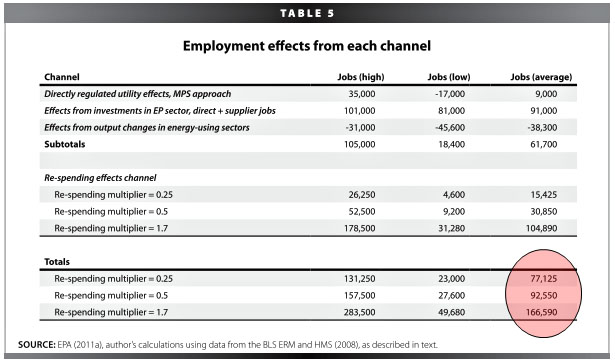Is the EPA a job-killing machine? On the off chance that empirical evidence still matters to anyone, Dave Roberts summarizes a bit of recent research into this question from the Economic Policy Institute. First up, Isaac Shapiro takes a look at the costs and benefit of several new EPA rules:
The dollar value of the benefits of the major rules finalized or proposed by the EPA so far during the Obama administration exceeds the rules’ costs by an exceptionally wide margin. Health benefits in terms of lives saved and illnesses avoided will be enormous. Expressed in 2010 dollars:
- The combined annual benefits from all final rules exceed their costs by $32 billion to $142 billion a year. The benefit/cost ratio ranges from 4-to-1 to 22-to-1.
- The combined annual benefit s from four proposed rules examined here exceed their costs by $160 billion to $440 billion a year. The benefit/cost ratio ranges from 12-to-1 to 32-to-1.
OK, fine: the rules will save lives and improve our health. But at what cost in the tidal wave of jobs lost just to get a bit of mercury and soot out of the air? EPI’s Josh Bivens runs the numbers for one of EPA’s biggest initiatives, the “air toxics” rule. Here’s the final tabulation:

So there are job losses in some sectors and job gains in others. The middle estimate for the aggregate effect is +61,000 jobs. When you account for spending multipliers, the aggregate effect is somewhere between 77,000 and 166,000 jobs.
If you want to, you can still object to these rules. Maybe you can argue that they’re distortionary in some way, or that there are cheaper ways of getting the same results. Maybe. But even if the rules aren’t perfect, their benefits far exceed their costs and they actually produce additional jobs for the economy. Dave sums things up:
Conservatives are hiding behind abstractions — job-killing big-government blah-blah — but don’t be fooled. They are not protecting “the economy” or “jobs.” They are protecting a specific set of polluting industries, at the expense of the public interest. Put that horsesh*t in any ideological serving dish you want. It still stinks.













